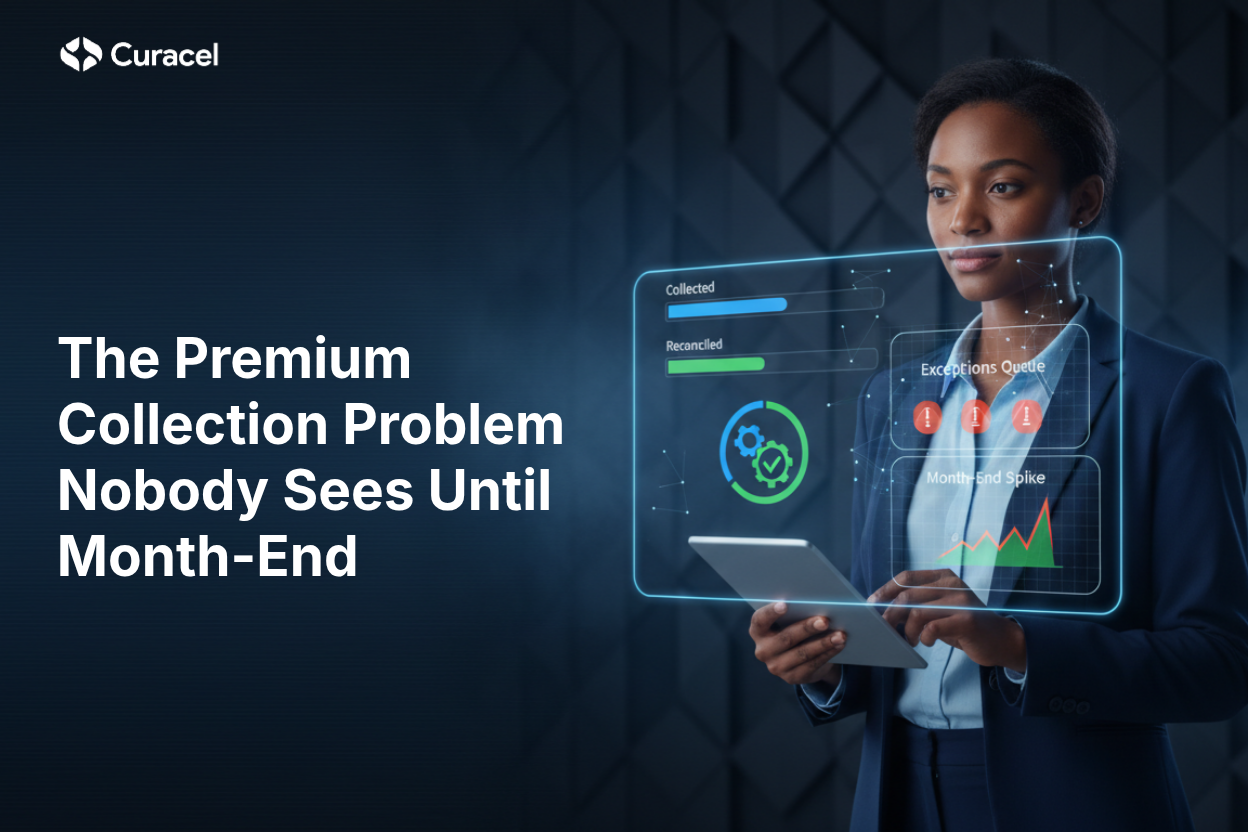Generative AI in Health Insurance: Revolutionizing Efficiency, Accuracy, and Customer Experience
The health insurance industry stands on the brink of a technological revolution. Among the transformative forces driving change, generative AI in health insurance is emerging as a game-changer—reshaping everything from claims processing to fraud detection, customer support, and risk assessment. As insurers seek smarter, faster, and more cost-effective solutions, generative AI offers unprecedented opportunities to streamline operations, enhance accuracy, and deliver a superior customer experience.
In this blog post, we’ll explore what generative AI is, why it’s vital for health insurance, practical applications reshaping the sector, challenges to overcome, and how Curacel is leading the charge in harnessing this technology to deliver real-world impact.
What Is Generative AI, and Why Does It Matter for Health Insurance?
Generative AI refers to machine learning models capable of creating new content—whether text, images, or even complex data—based on the patterns and knowledge learned from vast datasets. Unlike traditional AI models that mainly classify or predict, generative AI can generate coherent, contextually relevant outputs.
In health insurance, this means systems can autonomously:
- Generate accurate medical claim adjudications
- Draft automated, personalized customer communications
- Create detailed fraud detection scenarios
- Synthesize complex medical documentation
- Support real-time decision-making with predictive insights
The potential is huge because health insurance deals with massive, complex, and highly regulated data—claims, medical codes, customer interactions, and risk factors. Generative AI’s ability to understand and produce nuanced outputs improves accuracy and efficiency while reducing human workload and errors.
Key Applications of Generative AI in Health Insurance
1. Automated Claims Processing and Adjudication
Claims processing is one of the most time-consuming and error-prone areas in health insurance. Manual review leads to delays, mistakes, and increased costs. Generative AI can read and interpret clinical notes, physician reports, and claim forms, then automatically generate claim adjudications consistent with policy rules and medical guidelines.
This technology can handle:
- Extracting key medical codes like ICD-10 or CPT
- Detecting inconsistencies or anomalies in claims
- Generating explanations for claim denials or approvals
- Speeding up approval workflows
The result? Faster turnaround times, lower operational costs, and higher accuracy—boosting insurer and customer satisfaction alike.
2. Fraud, Waste, and Abuse Detection
Fraudulent or wasteful claims cost insurers billions annually. Generative AI models trained on historical claims data can identify subtle patterns and generate new hypothetical fraud scenarios that help proactively flag suspicious activities. Unlike static rule-based systems, these AI models continuously learn from emerging fraud tactics.
Generative AI can:
- Simulate potential fraud patterns to train detection models
- Generate synthetic data to augment scarce fraud datasets for better model training
- Provide detailed contextual insights into suspicious claims for human investigators
This proactive approach drastically reduces losses and improves overall system integrity.
3. Personalized Customer Engagement and Support
Health insurance customers expect quick, clear answers and smooth interactions. Generative AI powers intelligent chatbots and virtual assistants that generate personalized responses to member inquiries—whether about coverage details, claim status, or benefit explanations.
Benefits include:
- 24/7 support with natural, conversational language
- Automated generation of policy summaries or claim updates
- Proactive notifications and guidance based on individual health profiles
By automating routine queries and tailoring communications, insurers can reduce support costs and increase member engagement.
4. Medical Coding and Documentation Automation
Medical coding accuracy is critical for claims processing and regulatory compliance but requires specialized skills and significant manual effort. Generative AI can read clinical documentation and generate accurate, standardized codes automatically.
This reduces coding errors, accelerates claim submission, and improves data quality for analytics and reporting.
5. Risk Assessment and Underwriting Insights
Generative AI can synthesize data from multiple sources—medical records, social determinants of health, historical claims—to generate comprehensive risk profiles for underwriters. By simulating various scenarios, the technology helps insurers price policies more accurately and identify high-risk cases proactively.

Challenges and Considerations in Implementing Generative AI
While generative AI offers tremendous promise, several challenges need attention for successful adoption in health insurance:
- Data Privacy and Compliance: Health insurance data is highly sensitive. AI models must be designed and deployed to comply with regulations like HIPAA, GDPR, and local data protection laws.
- Data Quality and Bias: The accuracy of generative AI depends on the quality and diversity of training data. Biased or incomplete data can lead to flawed outputs and unfair decisions.
- Explainability: Insurance decisions must be transparent and explainable to regulators and customers. Complex AI models can be opaque, requiring robust mechanisms to interpret and validate AI outputs.
- Integration with Legacy Systems: Many insurers operate on legacy IT infrastructure. Seamless integration of generative AI tools without disrupting operations is a technical hurdle.
- Human Oversight: Despite automation, human experts must oversee AI-generated decisions to catch anomalies and provide judgment where needed.
Addressing these factors is critical to realizing generative AI’s full potential responsibly and sustainably.
How Generative AI Is Transforming the Health Insurance Landscape Today
Leading insurers worldwide are already piloting or deploying generative AI solutions in various capacities:
- Some health plans use AI-powered automation to reduce claims processing times from weeks to days or even hours.
- Fraud detection systems enhanced by generative AI have reported double-digit reductions in fraudulent payouts.
- AI chatbots with natural language generation provide personalized member support, improving customer satisfaction scores significantly.
- Automated medical coding solutions increase coding accuracy while reducing staff workload by over 50%.
These advances drive operational efficiency, regulatory compliance, and better member experiences—giving early adopters a competitive edge in a crowded marketplace.
Why Curacel Is Ahead of the Curve on Generative AI in Health Insurance
At Curacel, we don’t just follow trends—we set them. Our platform leverages cutting-edge generative AI models tailored specifically for health insurance workflows. Here’s how Curacel is leading the revolution:
- Integrated AI-Powered Claims Automation: Curacel automates the entire claims adjudication process, using generative AI to interpret clinical data, verify coverage, and flag anomalies—all in near real-time.
- Advanced Fraud Detection Engine: Our AI continuously learns from claims data across multiple markets to generate new fraud detection scenarios, enabling proactive and dynamic fraud prevention.
- Human-in-the-Loop Quality Control: We combine generative AI with expert human oversight, ensuring decisions are accurate, compliant, and transparent.
- Seamless Integration: Curacel’s API-first architecture integrates smoothly with existing insurer systems, enabling rapid deployment without disruption.
- Personalized Customer Experience: Our AI chatbots and notification systems generate personalized, clear, and timely communication, elevating member satisfaction and engagement.
By innovating at the intersection of AI and insurance, Curacel empowers health insurers to achieve faster, smarter, and more reliable operations—ultimately improving outcomes for insurers and insured alike.
Conclusion: Embrace the Future with Generative AI in Health Insurance
Generative AI is not just a buzzword—it’s the future foundation of a transformed health insurance ecosystem. From automating complex claims workflows to detecting fraud with precision and delivering personalized customer care, generative AI unlocks new levels of efficiency and accuracy previously unattainable.
For health insurers committed to staying competitive, embracing generative AI technology is no longer optional; it’s imperative. And partnering with a proven leader like Curacel means accessing the expertise, innovation, and robust platform to make that transition seamless and impactful.
Ready to transform your health insurance operations with the power of generative AI? Discover how Curacel’s AI-driven solutions can streamline your claims processing, enhance fraud detection, and revolutionize member experience. Visit Curacel’s website today and be part of the AI-powered future of health insurance.
Subsribe to our newsletter to receive weekly content


























.svg)







